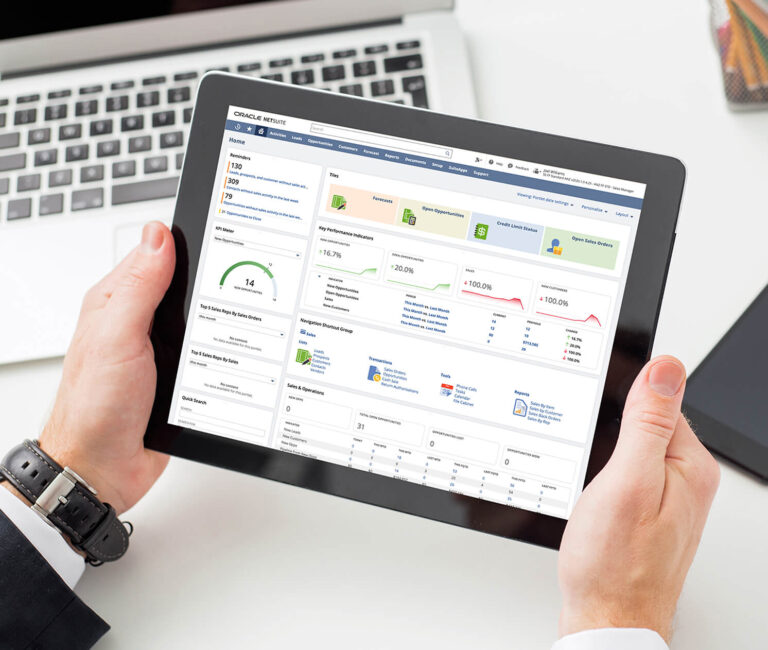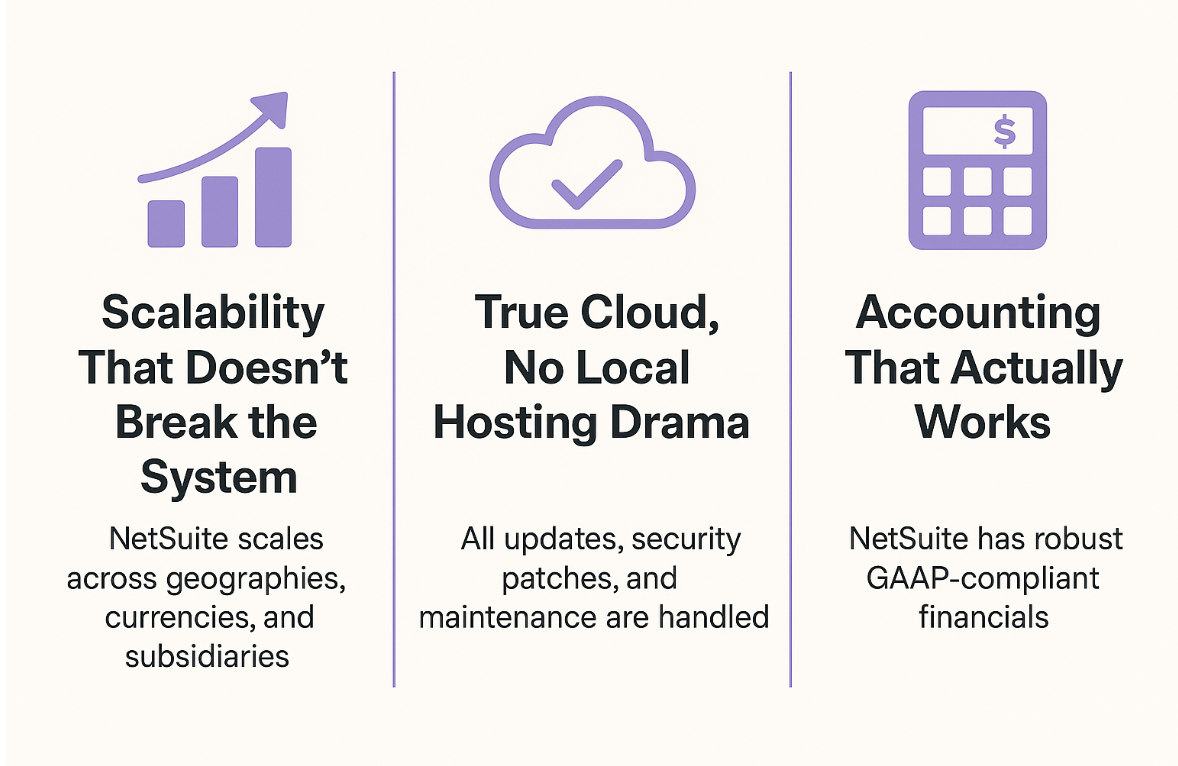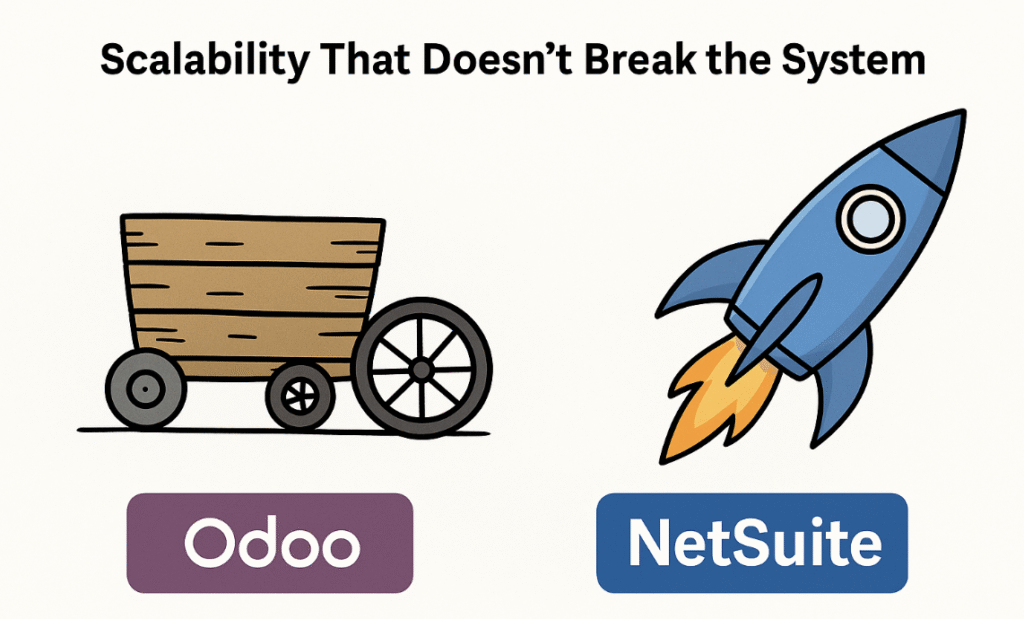
The Financial Benefits of NetSuite for Bangladeshi SMEs
The Financial Benefits of NetSuite for Bangladeshi SMEs First of all, let’s know why NetSuite for Bangladesh is the #1 cloud ERP? See, small and
When you’re growing fast and your tech stack starts sweating, the last thing you need is an ERP system that can’t keep up. That’s the story many businesses face with Odoo—an open-source darling that starts strong but often runs out of gas when it’s time to scale.
In this guide, we’re diving deep into the transition “From Odoo to NetSuite” — why it’s happening, what’s lacking in Odoo, and how NetSuite powers high-growth companies across industries. Whether you’re a CFO tired of month-end chaos or a founder who just wants one version of the truth, read on.
Odoo is an open-source ERP system. It’s modular, customizable, and initially budget-friendly. Startups and small businesses love the flexibility—after all, you can add modules as you grow.
But that’s the catch.
You start with a simple CRM and a finance module. Then you need inventory, HR, project tracking, eCommerce, subscription management—and suddenly you’re juggling dozens of apps that don’t quite talk to each other.
Sound familiar?
It’s like buying IKEA furniture. Sure, it’s affordable and modular. But assembling it and keeping it sturdy during a storm (or an IPO) is a different story.
Because while Odoo gives you parts, NetSuite gives you an unified platform.

NetSuite is cloud-native. You don’t have to manage upgrades or bolt on separate modules with custom code. Whether you’re operating in 1 country or 30, NetSuite ERP scales with you—across geographies, currencies, and subsidiaries.
Odoo, by contrast, can feel like a stack of duct-taped apps once your operations hit complexity. Its custom modules often conflict during upgrades, causing downtime and data issues.
While NetSuite runs entirely on Oracle’s robust cloud infrastructure, Odoo still offers a self-hosted version. This means security, uptime, and IT management fall on your shoulders unless you pay extra for their enterprise cloud offering (which still isn’t as seamless).
With NetSuite, all updates, security patches, and performance upgrades are handled in the background. Zero maintenance headaches.
Let’s face it—Odoo’s accounting module is… basic. Built more for general use than GAAP compliance, its reporting and financial workflows lack depth.
NetSuite’s accounting, on the other hand, is a beast—in a good way. Real-time dashboards, multi-book accounting, global tax support, automated journal entries, and built-in compliance make it the go-to for CFOs and auditors alike.

Yes—especially if your business is growing or expanding internationally. While Odoo is decent for early-stage startups, NetSuite shines when things get serious. Think consolidated reporting, role-based permissions, SOX compliance, and enterprise-level integrations.
Migration can be straightforward with the right partner. Data mapping tools and ETL platforms like Celigo or Dell Boomi help automate much of the process. However, it’s important to clean and normalize your Odoo data beforehand.
Tip: Don’t DIY the migration. Hire experts.
Upfront—yes. But if you factor in hidden Odoo costs (custom development, upgrade risks, downtime), NetSuite often ends up being cheaper over 3–5 years. Plus, NetSuite saves you money through automation and reduced manual work.
Don’t worry. NetSuite’s SuiteScript and SuiteFlow allow deep customizations—and there’s an entire ecosystem of SuiteApps you can plug in without breaking anything.
Odoo is like your high school car. It worked great when all you needed was to drive to class. But now you’re running a company. You need horsepower, safety, speed, and a dashboard that doesn’t fall off during tax season.
“You can keep patching a sinking boat—or get on a yacht.”
Time to move up. Take a free NetSuite tour with us from here.
Oracle NetSuite Official Site – Learn what NetSuite can do
G2 Comparison: NetSuite vs. Odoo – See verified user reviews
Switching ERP systems is no small feat. But clinging to one that’s slowing you down is far worse. If Odoo is holding your team back, it’s time for a new chapter. NetSuite is more than software—it’s peace of mind, strategic clarity, and serious ROI.
Because let’s face it: You didn’t build your company to manage spreadsheets. You built it to scale.
And NetSuite? That’s the rocket fuel.

The Financial Benefits of NetSuite for Bangladeshi SMEs First of all, let’s know why NetSuite for Bangladesh is the #1 cloud ERP? See, small and

Safeguarding quantum information from errors is easy when you learn how each codes…

High-Dimensional Data Clustering Using Deep Learning Models in Bioinformatics